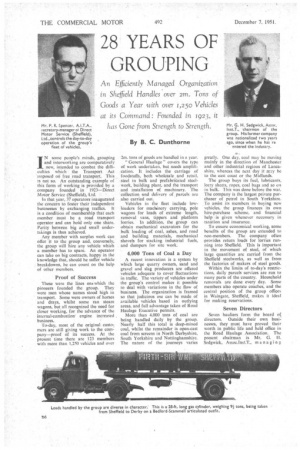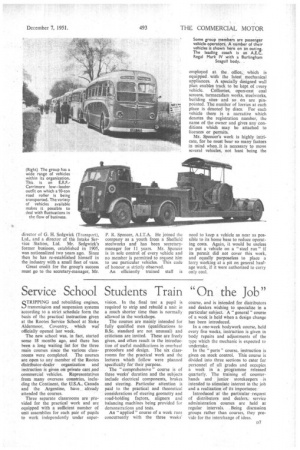28 YEARS OF
Page 46

Page 47

If you've noticed an error in this article please click here to report it so we can fix it.
GROUPING
IN some people's minds, grouping and interworking are comparatively new, iatended to combat the difficulties which . the Transport Act imposed on free road transpart. This is not So. An outstanding example of this form of working is provided by a .company founded in 1923—Direct Motor Service (Sheffield), -Ltd.
In that year, 37 operators inaugurated the concern to foster their independent businesses by exchanging traffics. It is a condition of membership that each member must be a road transport operator and can hold only one share. Parity between big and small undertakings is thus achieved.
Any member with surplus work can . oiler it to the group and, conversely, the group will hire any vehicle which a member has to spare. An operator can take on big contracts, happy in the knowledge that, should he suffer vehicle breakdowns, he can count on the help of other members.
Proof of Success
These were the lines on which the pioneers founded the group. They were men whose names stood high in transport. Some were owners of horses and drays, whilst some ran steam wagons, but all recognized the need for closer working, for the advance of the internal-combustion engine increased business.
To-day, most of the original custo; niers are still giving work to the company—proof of its success. At the present time there are 123 members with more than 1,250 vehicles and over
2m. tons of goods are handled in a year.
"General Haulage" covers the type of work undertaken, but needs amplification. It includes the carriage of foodstuffs, both wholesale and retail, steel in bulk and prefabricated steelwork, building plant, and the transport and installation of machinery. The collection find delivery of parcels are also carried out.
Vehicles in the fleet include lowloaders for machinery carrying, pole wagons for loads of extreme length, removal vans, tippers and platform lorries. In addition, the group can obtain mechanical excavators for the bulk loading of coal, ashes, and road and building materials, mechanical shovels for stacking industrial fuels, and dumpers for site work.
4,000 Tons of Coal a Day
A recent innovation is a system by which large quarry owners, sand and gravel and slag producers are offered vehicles adequate to cover fluctuations in traffic. The variety of vehicles under the group's control makes it possible to deal with variations in the flow of business. The organization is framed so that judicious use can be made of available vehicles based in outlying areas, and full advantage taken of Road Haulage Executive permits.
More than 4,000 tons of coal are being handled daily by the group. Nearly half this total is deep-mined coal, whilst the remainder is open-cast coal from screens in North Derbyshire, South Yorkshire and Nottinghamshire. The nature of the journeys varies greatly. One day, coal may be moving mainly in the direction of Manchester and other industrial regions of Lancashire, whereas the next day it may be to the east coast or the Midlands.
The group buys its fuel, lubricants, lorry sheets, ropes, coal bags and so on in bulk. This was done before the war. The company is the largest private purchaser of petrol in South Yorkshire. To assist its members in buying new vehicles, the group finances its own hire-purchase scheme, and financial help . is given whenever necessary in taxation and insurance.
To ensure economical working, some benefits of the group are extended to non-members. The company often provides return loads for lorries running into Sheffield. This is important in the movement of steel, of which large quantities are carried from the Sheffield steelworks, as well as from the factories of makers of steel goods.
Within the limits of to-day's restrictions, daily parcels services are run to many parts of the country. Household removals are done every day. Some members also operate coaches, and the central position of the group offices in Waingate, Sheffield, makes it ideal for making reservations. .
Seven Directors Seven hauliers form the board of directors. Outside their own businesses, they must have proved their worth in public life and held office in the Road Haulage Association, The present chairman is Mr. G. H. Sedgwiek, Assoelnst.T., managing director of a H. Sedgwiek (Transport), Ltd., and a director of the Intake Service Station, Ltd. Mr. Sedgwick's former business, established in 1905, was nationalized two years ago. Since then he has re-established himself in the industry with a small fleet of vans.
Great credit for the group's success must go to the secretary-manager, Mr.
P. R. Spencer, A.I.T.A. He joined the company as a youth from a Sheffield steelworks and has been secretarymanager for II years. Mr. Spencer is in sole control of every vehicle and no member is permitted to request him to use particular vehicles. This code of honour is strictly observed.
An efficiently trained staff is employed at the office,. which is equipped , with the latest mechanical appliances. A specially designed wall plan enables track to be kept of every vehicle. Collieries, open-cast coal screens., tarrnacadam works, steelworks, building sites and so on are pinpointed. The number of lorries at each place is denoted by discs. For each vehicle there is a narrative which denotes the registration number, the name of the owner and gives any conditions which may be attached to licences or permits, Mr. Spencer's work is highly intricate, for he must bear so many factors in mind when_ it is necessary to move several vehicles, not least being the need to keep a vehicle as near as passible to its home base to reduce operating costs. Again, it would be useless to put a vehicle on a "steel run" if its permit did not cover this work, and equally purposeless to place a lorry working at a pit on general haulage work, if it were authorized to carry only coal.
































































































